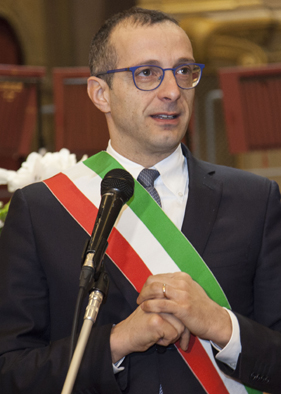April 2020, Year XII, no. 4
Matteo Ricci
The Popular Mayor
"Mayors can impact the centre-left and make it more competitive through the example of good administration. We have a class of mayors that has already defeated populism, or rather, the Popular Mayors. Citizens evaluate us and then, if they’re convinced, they choose us. In the local territories we have a large ruling class. First Citizens bring people together, they don’t divide. They’ve already proven this."
Telos: Every time someone talks about the direct election of the Prime Minister, people use the very evocative expression “Mayor of Italy”. So, is it true that a Mayor has, in the administration of his or her own city, more power than the Prime Minister has today?
Matteo Ricci: The direct election of the Mayor and the two-round majority voting system is what has worked better. This way, citizens have begun to trust politics again, in the aftermath of the Tangentopoli scandal, through the First Citizens. The community is fully represented in the role of the Mayor. It isn’t so much a question of power, as of authoritativeness. Mayors have to handle questions that fall outside the competence of Municipalities, Regions, Nations and even Europe. This is also why the role of Mayor, in these years, has acquired authoritativeness: underneath that tri-colour sash there’s a whole lot of work, effort and even risk. Mayors are the ones who have the greatest responsibilities, and low compensation. It’s no wonder that in recent months along with the ALI-Italian Local Autonomies, we’ve been fighting to give Mayors of small Municipalities a decent minimum salary, and because of our battle, starting this year they will receive a salary of at least 1400 euros a month. To acknowledge the dignity of the role of Mayor, because it is truly different from all the other institutional roles.
The breakdown in the party system has very likely been the source of people’s widespread anti-political sentiment. And yet this gap between citizens and politics is not nearly as wide when it comes to the mayor. Are your citizens still passionate about politics?
I see that there’s a closeness between the Mayor and citizens. You either love your Mayor or you hate him, citizens can tangibly measure the distance between the promises and the things done. The person who is Mayor has to have at least two characteristics: first of all, they have to like being around people, feeling their city breathe. I live just a few hundred metres from the Town Hall, but I usually go by bike, not just because Pesaro is the bicycle City, but because if I walked, it would take me more than half an hour! As soon as I leave the house, people stop me to ask me all kinds of different things. The second characteristic is the popular approach of the Mayor, or the ability to be around people, where the people work, suffer and have fun. They’re always in the trenches, on the frontline in emergencies: these dramatic days of the Coronavirus are concrete proof. This brings the Mayor closer to citizens.
However, mayors cannot be afraid to make decisions, because they are called to do this everyday. Anybody who is afraid of making decisions cannot be Mayor. However, despite the daily problems, anybody who has been Mayor says this is indeed the most wonderful experience.
First citizens are brought together by passion and commitment to people who want to work towards the common good and a better future. Helping to bolster this by starting with the place where they live. I think this is why, to give an example, mayors are so popular among kids. In fact, for them the known world actually coincides with their own city. And the Mayor is their closest and most important reference.
You are the Mayor, Vice President of the ANCI and in charge of the Local Governments in the national secretary of the Democratic Party. An all-around politician. When you were re-elected in this last term you announced that “the PD will only be able to relaunch if it becomes the party of the local areas and of the Mayors and less of the internal currents.” What did you mean?
In the territories, there’s a lot of local energy that can be freed up for the Democratic Party, made up of administrators who have worked their way up, who know the citizens and constantly confront their consensus. Mayors can impact the centre-left to make it more competitive through the example of good administration. We have a class of mayors who have already defeated populism, or the Popular Mayors. In the last administrative elections, the same day we witnessed the success of the right-wing League in the European elections with more than 30% of the votes, many mayors of the PD, of the centre-left and the civic lists achieved the same result in their own city, winning the local elections against the centre-right candidates. This is what happened in Pesaro: the League got 34% of the votes in the European elections and the PD got 28%. The next day, I got nearly 58% of the votes. This is what happened in Bergamo, Florence, Bari, Pesaro, Modena and many other municipalities throughout Italy where the mayors of the PD were clearly confirmed. Citizens evaluate us and then, if they’re convinced, they choose us. In the local territories, we have a large ruling class. First citizens bring people together, they don’t divide. They’ve already proven this. So, the PD and the centre-left, the reformist area, and the Europeanist area that we need to build has to start again with the people the populists already defeated with a popular approach. We have popular administrators, even including Stefano Bonaccini, who won in Emilia Romagna and beat Salvini’s League party with these same characteristics.
A few months ago, with the appointment of Francesca Frenquellucci as the Assessore for Innovation, you opened your Executive committee up to a representative of the Five-Star Movement. The first experiment at the local level of a PD-Five-Star Movement administration. And in October of last year you entrusted her with relationships with the university.This appointment had quite an impact throughout Italy, and even sparked polemic. Can you tell us why you made this choice?
The PD and the Five-Star Movement govern at the national level, but we can’t figure out why they can’t do it at the local level. It’s a very simple issue: the longer the government lasts, the more the alliance between the centre-left and the Five-Star Movement will become structural.
The problem for Five-Star is that they have to decide which side they’re on, but for me it’s obvious that if you make decisions together at the national level you have to try and do it at the local level as well, like we did in Pesaro, starting with the content, with concrete actions and with programmes, in the interests of the citizens. With Francesca Frenquellucci we found convergence in the Council on the re-opening of university courses in the city, at conditions that were sustainable for the municipality.
In just a few months extraordinary results were achieved, in agreement with the Università Politecnica delle Marche to activate a 3-year university course in the city, starting next October. This is a very important course of study in Industrial and Information systems, which will generate benefits for our enterprises and for employment. So as a next step it just seemed logical to me to ask her to join the team as the Assessore for Innovation.
We were the first Municipality in Italy to do something like this, strengthened by being coherent in the path taken, and I hope there will be many other administrations around Italy that try to do what we have done. Our collaboration is really working well, Francesca Frenquellucci is doing a great job, even during the Coronavirus emergency, handling economic activities. This is proof that if you want to collaborate, you find points of agreement. Politics is made up of people, but you need to be concrete and coherent at the same time.
Sooner or later the Five Star Movement will have to make this choice. Besides, now that between Premier Conte and the PD, so between the main representative heading up the Five-Star world, even though he’s a technocrat, and the PD there’s a very strong relationship of great and productive collaboration.
Marco Sonsini
Editorial
Matteo Ricci isn’t a mayor who just walked in off the street. He’s one of those old-school mayors, the ones who have politics in their blood, who have been fed on politics since adolescence, who have moved up through the ranks and learned the art of administrating public affairs on the field. Just take a quick look at Ricci’s CV: in secondary school he joined the youth organisation Left and Sinistra Giovanile (Young Socialists), then the Democratic Party of the Left (PDS). Starting when he was twenty, he was elected, in this order, to serve on the Pesaro City Council, as the town secretary of the Democrats of the Left (DS) and then again to the City Council with more votes than any other candidate in the city. He joined the Democratic Party (PD) and was elected provincial secretary and then President of the Province of Pesaro and Urbino. In 2013 he became a member of the national executive committee of the PD, where he was appointed Vice President until 2017, and from 2016 to 2018 he was responsible for the Local Governments. Today, he is a member of the Executive of the political and institutional functions of the party.
Since 2014 he has been the Vice President of ANCI (National Association of Italian Municipalities) and in November 2018 he became president of ALI (Italian Local Autonomies) and from the outset he has been fighting for the acknowledgment of mayors’ huge responsibility: in fact, he submitted a Draft Bill establishing, among other things, a net salary for mayors of no less than 1,500 euros.
A crucial battle, which he also refers to during our interview where he reiterates the injustice of serving as the mayor of a small municipality with a salary that doesn’t allow you to do your job: “it’s a political as well as a cultural issue. Today, mayors” Ricci adds, “have the greatest responsibility but low compensation, they even work 24/7, more than the people in Parliament or regional council members, and this commitment, full of responsibility, needs to be acknowledged.”
A champion of the role played by mayors, he’s always poised for battle, but not through the unconstructive complaining of people who have no idea what they’re talking about, but rather through precise analysis of the problem and a simple, clear proposal.
The coronavirus crisis indeed offers us one example.
In early April, Ricci addressed the government asking for the mayor to become a streamliner, asking for a ‘Healing Italy’ Decree for Municipalities, and yes, greater powers, but to streamline and speed processes up both in the emergency phase and in the recovery phase.
According to Ricci, municipalities will form the basis of reconstruction and will have to get public investments allocated straightaway.
But “with the Procurement Code in force, we won’t see any investment for two years, yet they’ve got to take off within two months. If we hadn’t gained autonomy in the criteria and choices regarding food coupons, we would have been distributing them in the middle of August, not at Easter. When you have to cope with a dramatic, grave situation, the key is to remove red tape and speed processes up. Either you do things straightaway or they risk not being needed.”
Knowing how to do politics also means being able to interpret how scenarios change, be a trailblazer for new political experiences, speak clearly and explain the political reasons for your choices: in October 2019 Pesaro was the first centre-left municipality that opened up to Five-Star, and he did this by choice, not out of necessity. “In the new political landscape with a national government that is the fruit of an alliance between the Democratic Party and the Five-Star Movement, what we wanted to do politically was to make Pesaro a political-administrative laboratory. Having a majority isn’t a problem for me because I won the municipal elections by a landslide at the first round, so this agreement is not the result of a need for numbers. Rather, we want to start collaborating on very concrete things.”
Ricci made the Pesaro-born Five-Star Movement leader Francesca Frenquellucci competence on the University matters, not a full-fledged member of the Executive Committee, but almost, what they call a councillor delegate, but in February 2020 Ms Frenquellucci joined, with widespread approval, the Executive Committee as the Innovation Assessore, with heavy mandates like the one regarding economic activities. On this occasion Ricci declared, “We have to govern till 2023? Then let’s stop being hypocritical. It’s clear that this government has become a different political project compared to the past [opening to a possible agreement between the PD and Five-Star at the regional level as well, in view of the upcoming elections in the Marche Region], and Pesaro is a model for the nation, if we’ve managed to come to a synthesis starting from different positions, this can be done anywhere.”
What cover have we come up with for Pesaro? This time we were also inspired by the city’s coat of arms. We have genetically modified and revisited the symbols of two important families that ruled in Pesaro during the Renaissance: the lion of the House of Sforza and the oak of the House of della Rovere, which Guido Ubaldo II donated just a few days before he died in 1574 to the city banner with the words: “I’m donating my oak to you and I want it to be placed on the Community’s coat of arms above the white and red districts with four shaking hands supporting the oak and below the motto:‘ Perpetua et firma fidelitas’ and I want to be named Lord and your father”. The Municipality of Pesaro satisfied the Duke’s will, thereby creating the city’s coat of arms, adding the inscription ‘Munus GuidUbaldi de Ruvere Pisauri domini et patris’.
Mariella Palazzolo

Matteo Ricci has been the Mayor of Pesaro since 2014, elected as the head of a centre-left coalition. In 2019 he was re-elected in the first round with over 57% of the votes.
Since 2014 he has been the Vice President of the National Association of Italian Municipalities (ANCI) and in November 2018 he became President of the Italian Local Autonomies (ALI).
During secondary school, he joined the youth organisation Left and Sinistra Giovanile (Young Socialists), then the Democratic Party of the Left (PDS). In 1999 was elected to serve on the City Council of Pesaro. In 2003 he became the town secretary of the Democrats of the Left (DS) of Pesaro. In 2004 he was re-elected to the City Council and got the most votes citywide.
He joined the Democratic Party (PD), and in 2008 was elected provincial secretary. From 2009 to 2014 he served as the President of the Province of Pesaro and Urbino.
In 2013 he became part of the national executive committee of the PD, where he was appointed Vice President until 2017 and from 2016 to 2018 was in charge of the Local Governments. Now he is a member of the Executive of the political and institutional functions of the Party.
He has written two books: L'Italia alla ricerca della felicità [Italy in the Pursuit of Happiness] and Primo, cittadino. Perché l'Italia può (ri)partire dai sindaci [First, Citizen. Why Italy can (re)start with mayors].
When speaking to his fellow citizens, he often says: “Proud to live in a provincial reality: this means keeping your feet on the ground and pedalling harder than the others. However, without being provincial, because that means flying low. And Pesaro deserves great ambitions.”
He was born in Pesaro in 1974 and graduated in 2003 in political science from the University of Urbino with a thesis entitled “Towards a European Constitution”.
He is very reserved, little slips through about his private life, not even on social media, where he is very active and has thousands of followers, particularly on Instagram matteopesaro and Twitter @matteoricci
What’s one thing we’re certain of ? He loves riding his bike.
Marco Sonsini







SocialTelos